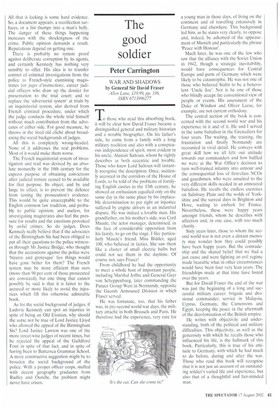The good soldier
Peter Carrington
WAR AND SHADOWS by General Sir David Fraser Allen Lane, £10.99, pp. 336, ISBN 0713996277 To those who read this absorbing book, it will be clear how David Fraser became a distinguished general and military historian and a notable biographer. On his father's side, he came from a family with a long military tradition and also with a conspicuous independence of spirit, most evident in his uncle, Alastair Saltoun, whom he rightly describes as both eccentric and lovable. Those who knew Lord Saltoun will instantly recognise the description. Once, suddenly accosted in the corridors of the House of Lords, to be told of the problems of fortifying English castles in the 13th century, he showed an enthusiasm equalled only on the same day in the same place by his implacable determination to put right an injustice suffered by engine drivers in an industrial dispute. He was indeed a lovable man. His grandfather, on his mother's side, was Cyril Maude, the actor manager, determined, in the face of considerable opposition from his family, to go on the stage. I like particularly Maude's friend, Miss Bidder, aged 100, who believed in fairies. She saw them like a cluster of small electric bulbs but could not see them in the daytime. Of course not, says Fraser!
From childhood he had the opportunity to meet a whole host of important people. including Marshal Joffre and General Geyr von Scheppenburg, later commanding the Panzer Group West in Normandy, opposite the Guards Armoured Division in which Fraser served.
He was fortunate, too, that his father was, in pre-second world war days, the military attaché in both Brussels and Paris. He therefore had the experience, very rare for a young man in those days, of living on the continent and of travelling extensively in Germany and elsewhere. This background led him, as he states very clearly, to oppose and, indeed, be ashamed of the appeasement of Munich and particularly the phrase 'Peace with Honour'.
Much later, he was one of the few who saw that the alliance with the Soviet Union in 1942, though a strategic inevitability, would have consequences for Central Europe and parts of Germany which were likely to be catastrophic. He was not one of those who believed Stalin to be a benevolent 'Uncle Joe'. Nor is be one of those who blindly accept the conventional view of people or events. His assessment of the Duke of Windsor and Oliver Leese, for example, are not current orthodoxy.
The central section of the book is concerned with the second world war and his experience in it and of it. He and I served in the same battalion in the Grenadiers for four years. The waiting, the training, the frustration and finally Normandy are recounted in vivid detail. He conveys with great skill how we all felt; our attitude towards our commanders and how baffled we were at the War Office's decision to turn well-trained infantry into armour and the consequential loss of first-class NCOs and guardsmen, who were unsuited to the very different skills needed in an armoured battalion. He recalls the endless exercises on Salisbury Plain and the wolds of Yorkshire and the surreal days in Brighton and Hove, waiting to embark for France. Nevertheless, these were happy years amongst friends, whom he describes with affection and, in one case, with too much charity.
Sixty years later, those to whom the second world war is not even a distant memory, may wonder how they could possibly have been happy years. But the comradeship and the shared belief that we had a just cause and were fighting an evil regime made bearable what in other circumstances would have been four very lean years. The friendships made at that time have lasted over the years.
But for David Fraser the end of the war was just the beginning of a long and successful military career: brigade and divisional commander; service in Malaysia, Cyprus, Germany, the Cam croons and Egypt, keeping the peace in the aftermath of the decolonisation of the British empire.
He writes with objectivity and understanding, both of the political and military difficulties. This objectivity, as well as the generosity with which he recalls those who influenced his life, is the hallmark of this book. Particularly, this is true of his attitude to Germany, with which he had much to do before, during and after the war.
Those who read this book will recognise that it is not just an account of an outstand ing soldier's varied life and experience, but also that of a thoughtful and fair-minded man.






























































 Previous page
Previous page